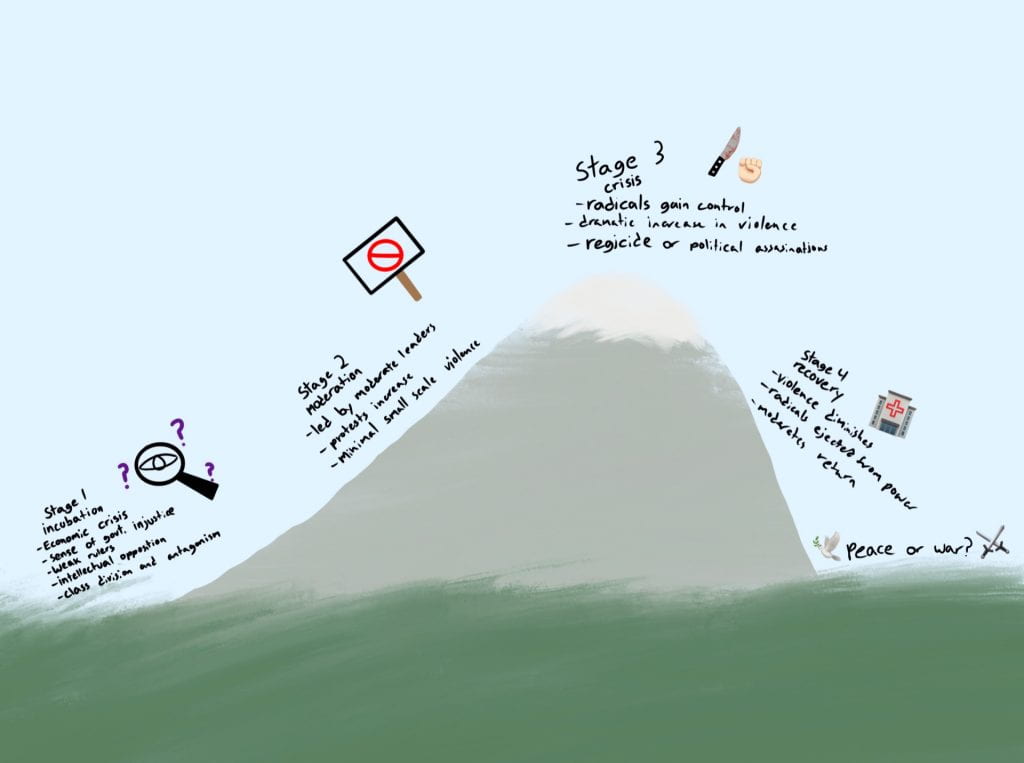Bonjour and welcome back to another Humanities blog post.
This project was called “Revolutions on Trial”, and in this project, as you may have guessed, we took famous revolutions and put them into a mock trial.
Crane Brinton – The Anatomy of a Revolution
Most of us started this project off not knowing much about revolutions, so one of the first pieces of building knowledge that we did, was learn why revolutions happen and what the different stages of a revolution look like. We studied Crane Brinton’s theory of revolutions, consisting of 4 main stages. The stages were incubation, moderate, crisis, and recovery, followed by a question of either peace or war? We were asked to create a diagram to showcase Crane Brinton’s theory, here is mine;
Animal Farm
A new thing that we did in this project, was study and read a book that was related to the topic. This book was called Animal Farm was written by George Orwell. This story of animals rebelling on a farm was created as an analogy for the events and characters in the Russian Revolution (Mar 8, 1917 – Jun 16, 1923). Every week we had new chapters to read and after every one, we had to write a little summary of the chapter with any questions we had. When we came into class, we would have to discuss what we read and our thoughts and feelings towards the chapters. We analyzed the events in the book to coincide with what we had learned about the anatomy of revolution. This was a good chance to practice identifying the stages of a revolution because we would need to use these same skills later on in the project.
The French Revolution
We were split into two different class rooms and assigned to a group with a revolution that we would be studying for the rest of the project. My group was the French Revolution, and we would be the ones arguing in defence of the revolution in the mock trial. After countless articles read, podcasts listened to, and YouTube videos watched, I had gained quite the chunk of knowledge on the French Revolution. We created graphic organizers to display some of what we had learned and if we identified any patterns of continuity and change. Here is my graphic organizer;
The Mock Trial
Once all the building knowledge on our revolution was done, we moved on to preparing for the trial. This included building an affidavit with the prosecution group from the other class, preparing a witness, and writing a script. We chose our witness to be Maximilien Robespierre, a prominent leader of the Jacobin club and headlined the famous “Reign of Terror” era in the time of the French Revolution. We worked side by side with the prosecution to concoct a script that we would be using for the trial. We had to come up with opening statements, closing statements, direct examination questions, and cross examination questions, all to hopefully prove that the revolution was, in fact, NOT guilty.
Now lets talk a bit about that. What do we mean by the revolution being guilty? Well, the PLP 9 court established a list of 6 criteria/goals that an effective revolution would have demonstrated. The revolutions would be judged on how many, if any, of those goals they achieved and to what extent they actually accomplished them. The criteria was as follows;
A revolution to be effective must include the reformation political systems aligning with the voice of the people, an increase of rights and freedoms for the people, a removal of a dictator with sweeping power, the achievement of financial stability, an improvement in standard of living, and the removal of internal conflict.
And as the defence, my team was arguing that the revolution was effective, and the prosecution was arguing the opposite. The mock trials would be taking place at the winter exhibition where we would have our live audience (a jury if you will) decide the fate of the revolution, guilty or not? Now unfortunately I was unable to be at the winter exhibition but luckily we were recording. Here is the video of the French Revolution, on trial.
Conclusion
Unfortunately we lost the trial to the prosecutors. But nevertheless I am very proud of how far my team came from the beginning and I am so sorry that I couldn’t be there in the end to help us win. Kudos to the prosecution though because they definitely were a very strong team and to be fair, we never stood a chance against them. Overall I really enjoyed learning about revolutions and I think that a mock trial was a super cool way to have us showcase what we had learned.
Thanks for reading!
As always, Brooke.


